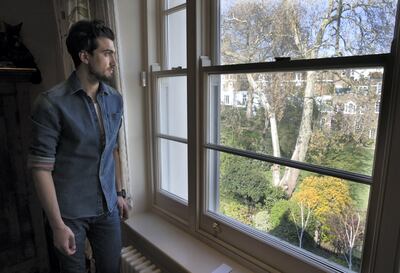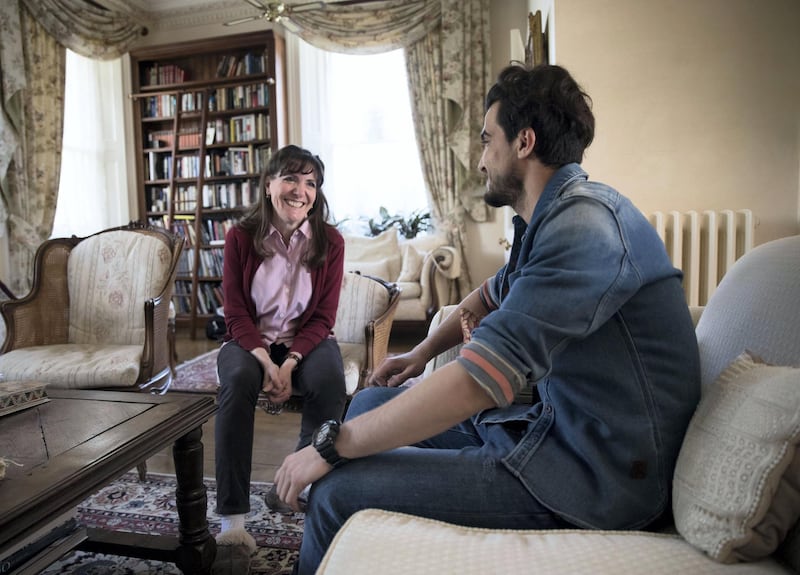When 25-year-old Basel first rang the doorbell of an imposing central London townhouse two years ago, he had few expectations and even fewer possessions. He had finally claimed asylum in the United Kingdom after travelling for months across countries whose names he did not know, to escape the war that had ravaged his hometown, the northern Syrian city of Aleppo.
Other Syrians had recommended a service matching refugees in need of temporary accommodation with households willing to take them in. He signed up, thinking a few nights sleep on a proper bed would do him good.
What has happened since he crossed the threshold still leaves him in a state of disbelief.
Karina, a Canadian businesswoman, greeted him as he cautiously stood by the door. A few days prior, she had read an article about the hosting service as she waited to board a flight to the United States and instinctively signed up for it. As she landed, her phone buzzed. They had a match.
On the day of Basel’s arrival, Karina had arranged for one of her two daughters – who had worked in the Middle East – to translate the rules of the house over Skype. “It was the most extraordinary transformation,” Karina said, recounting how Basel relaxed at the sound of his own language.

But he was not prepared for how the conversation would end. “I showed him everything and said, by the way, we are leaving in a couple of days,” Karina laughed. Basel was handed the keys to a three-storey mansion in one of London’s upmarket districts as the owners headed off to France.
Karina recalled that her husband wanted to postpone the move until their return. “He is homeless,” she replied.
Karina, who is Jewish, said this gesture was rooted in her own family history. “You know, life is tough. My mum was hidden during the war," she said, referring to World War Two. "Someone who was a complete stranger hid a husband, wife and child for a year at huge personal risk, much more than me risking my paintings being stolen. It was a very different thing – it was life or death.”
Refugees at Home, a grassroots initiative launched in 2016 by broadcast journalist Sara Nathan, has made it its mission to bring together refugees in need of accommodation with hosts like Karina who are willing to open their doors to them. On an average night, 160 refugees are hosted in British households through the service.
Ms Nathan came up with the concept for the online platform together with her brother, Timothy, and his wife, Nina, who wanted to host but did not know how to go about it.
"We knew that whatever we did to help refugees could not involve six weeks in Calais or Lesbos, but we could deploy our homes and our skills, so that seemed a very sensible thing to do," Ms Nathan told The National.
Working low-cost from their kitchen tables, the group began by drafting a list of people who could host, as well as organisations who could refer and vet the guests. The system they devised fills a gap that would otherwise lead many to destitution.
According to the Refugee Council, accommodation is one of the greatest challenges in the UK. Refugees who have had their asylum request approved by the Home Office have 28 days to rent a place that is both affordable and suitable before having to vacate the state-funded accommodation.
Asylum seekers who have had their claim turned down and are appealing the decision are also evicted. Despite not being legally entitled to work in the UK, they lose the right to the £37 a week in social welfare. As a result, they face barriers to the private rented sector and risk drifting into homeless or recurring to negative coping mechanisms.
According to Ms Nathan, navigating the bureaucracy of the UK immigration system is, at times, the greatest obstacle of all. “My 27-year-old son, if he was dumped somewhere with no bank account, no job, no language, he wouldn’t cope – why would anyone else’s son?” she said. “And my son hasn’t been traumatised, he hasn’t had a horrific journey and he hasn’t had to deal with the Home Office for six months. I don’t want another mother’s son to be in that position.”
Ms Nathan hosts two guests at a time on a rolling basis. So far, she has welcomed a dozen in her home. She said those who apply as hosts are disproportionately Jewish, LGBT members and Quakers – a splinter Christian group – as the refugees’ experience of persecution resonates with their own.
In the case of Basel and Karina – who have asked to be referred by their first names to protect their location – their painful past has brought them together more than they would ever have predicted.
The initial six-week stay arranged by Refugees at Home turned into Basel’s two-year stay with the family. Karina has since pushed him to pursue a degree in civil engineering rather than working night shifts in a restaurant. She has also come to the rescue in many occasions, hiring a lawyer when his brother was caught up in a police raid in Turkey or booking new tickets when his mother failed to board the flight that would take the family to Germany for resettlement.
While their bond is now solid, mutual acceptance has not been a straight path. "When I told Basel I was "yahudi" [Jewish in Arabic], he jumped from the chair," Karina remembered. The word Jewish had conjured in his mind the brutalities perpetrated against Palestinians by the Israeli army, and he wrestled to reconcile his benefactor with that image.
Karina, in turn, had to learn of Basel's beliefs as a Muslim. "Once I got home and Karina said something I did not understand about a date," Basel told The National. "I thought she wanted the date of when I was going to move out. Instead, she had got me dates for Ramadan."
Karina at time teases her daughters that Basel is her favourite son. For Basel, too, the experience has been life-changing. “Now I have two families,” he said.







